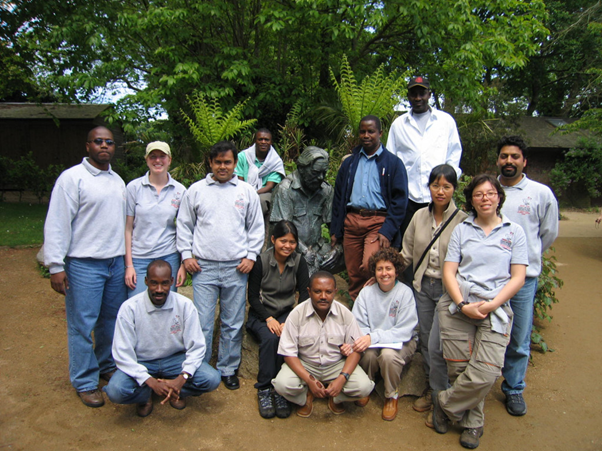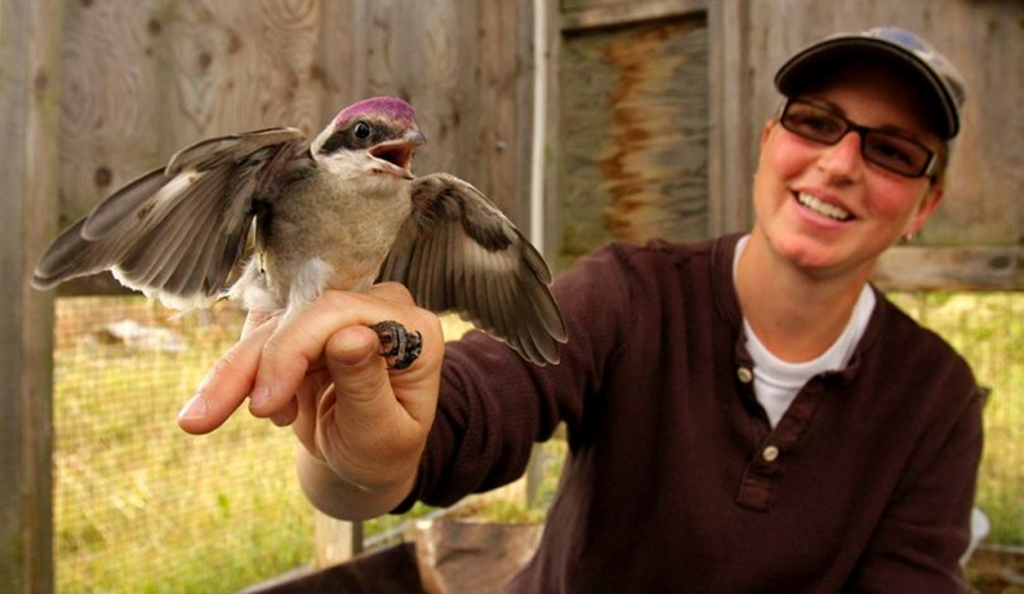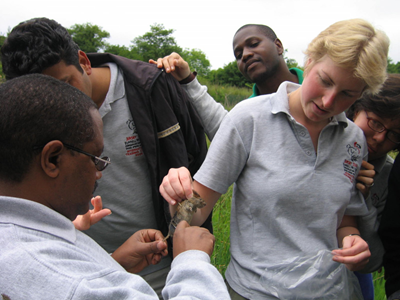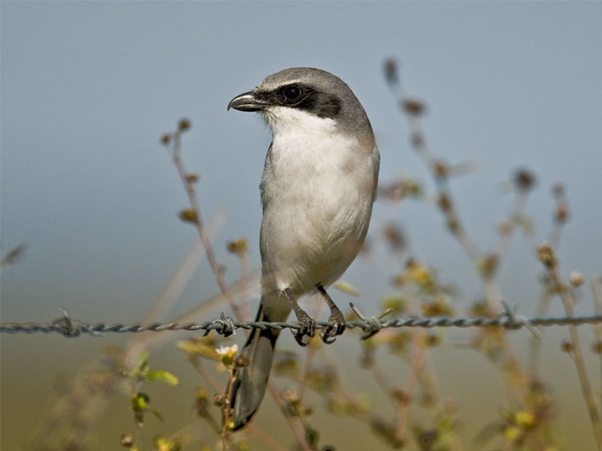News and Views
-
Blog: Thirty One Noahs
-
Thirty-One Noahs, One Ark and a Global Connection through Conservation
Jessica Steiner, is a 2005 Durrell Endangered Species Management (DESMAN) course graduate. Fifteen years later she is Conservation Programs Director for Wildlife Preservation Canada (WPC), and valuable member of Durrell's army. Read on to hear how her time on the course influenced her conservation career...
Opportunity of a Lifetime
When I arrived in Jersey to complete the DESMAN course in 2005, I felt like a conservation newbie. Having just recently completed my Masters in Wildlife Health and Population Management, and with a couple of contracts working with conservation breeding programs at my local Toronto Zoo under my belt, I was at the start of my career – full of hope and passion, eager to learn, and feeling slightly out of my league amongst the more seasoned conservation professionals on the course. That lasted perhaps a day. There is nothing like travelling far from home and being thrown into a dorm-style arrangement with like-minded individuals to build immediate connections and friendships.
How did I get here? I had the honour of being Canada’s New Noah that year. This prestigious program is awarded by Wildlife Preservation Canada (WPC) – a sister organization to Durrell Wildlife Conservation Trust, founded by Gerald Durrell in 1985. To keep his legacy alive, as well as the longstanding ties between the organizations, one young Canadian is selected from dozens of applicants to complete the DESMAN course in Jersey, followed by 6 months immersed in recovery work for some of the world’s rarest species in Mauritius. The opportunity of a lifetime, the program is meant to equip New Noah’s with the skills and confidence they need to make a difference in species conservation, and bring that capacity back home to Canada. Quite the honour. Quite the responsibility. I was on cloud 9! I had grown up reading Gerald Durrell, and couldn’t believe I was now standing here amongst the pages of his books.
"Being able to effectively and respectfully listen to diverse perspectives...is an essential skill in conservation that I rely on to this day".
The DESMAN course was full of conservation professionals from around the globe. While I learned much theory and practical applications from my time in Jersey, this was greatly enriched by my time with the other course participants. Learning from them and gaining a real world view of the challenges and opportunities in species conservation remains a highlight of my career. Being able to effectively and respectfully listen to diverse perspectives from people with various backgrounds is an essential skill in conservation that I rely on to this day.

Photo above: Jessica with her friends and course graduates of DESMAN . Photo Below: Valuable research completed by Jessica as part of the Loggerhead Shrike Recovery Programme
Conservation in Canada

Upon my return to Canada I have been fortunate enough to continue to work for WPC. Their mandate and mission to be Canada’s last defence for endangered species has always been the conservation space I’ve wanted to be in. Melding skills I’d gained in field work and captive population management, I quickly moved into a lead biologist role coordinating a large multi-faceted, multi-partner recovery program for Eastern loggerhead shrike - a unique raptorial songbird that is disappearing from Canadian grasslands with less than 25 pairs left in the country. These species on the brink deserve a chance. Ex-situ tools which involve activities outside of a species’ natural habitat, such as conservation breeding, headstarting, translocations and reintroductions are among the techniques available to recover species. WPC specializes in developing and applying these tools when appropriate, when populations have dwindled to such small numbers that habitat protection or restoration alone is not enough. While fulfilling this niche, we always work collaboratively and in partnership with many other organizations to ensure a holistic approach to our efforts.
 Leading the Way
Leading the Way I am now the Conservation Programs Director for the organization, overseeing and supporting our lead biologists who are implementing critical programs for endangered species across the country. I recently co-founded a new program in partnership with African Lion Safari called the Canadian Species Initiative which seeks to greatly expand this holistic and integrated approach to conservation to meet the needs of Canadian species at risk. This approach – termed the One Plan Approach by the IUCN’s Conservation Planning Specialist Group (CPSG) – has been gaining traction globally, with a recognized need here in Canada. The great need for this type of approach is something I learned while in Jersey, where in-situ and ex-situ management needs are tightly intertwined, making the Jersey Zoo a leader and trail-blazer in this regard. The Canadian Species Initiative now serves as the CPSG Canada Regional Resource Centre, and coincidently I am now working alongside colleagues who were once involved in my DESMAN training!
Photo Above: Training in small mammal monitoring during the DESMAN course.
I feel like I am realizing the dream I had when I decided to apply for the Canada’s New Noah program, that I am a contributing and valuable member of Durrell’s army. I was the 16th New Noah then, and we recently announced our 31st! I have looked forward to participating in the annual selection process, and living vicariously as they each depart for new adventures in Jersey and Mauritius, knowing that they will invariably make important contributions to the preservation of species on this planet. These days, we need all the help we can get!
www.wildlifepreservation.ca www.canadianspeciesinitiative.ca
Jessica participated in Durrell Conservation Academy's DESMAN graduate certificate which is designed to equip conservation professionals with a complete range of skills to maximise their effectiveness at managing or participating in conservation projects. You will learn the latest theory and practice of endangered species recovery, and gain a wide variety of skills in facilitation, management and leadership. Click here https://bit.ly/2SSAJJU for more information about the course and other conservation study opportunities.
If you would like to hear more about the work of WPC’s Conservation Programs Director Jessica Steiner, listen to her recent audio blog here on the Wildlife Preservation Canada website as she discusses her career path, the importance of WPC's work, and the types of skills younger conservation leader should be trying to develop to make a bigger conservation impact.

Photo above: the Eastern Logger Head Shrike is Critically Endangered, fast disappearing from the grasslands of Canada (wildlifepreservation.ca)
A note on Canada's Noahs
Wildlife Preservation Canada (WPC) is a Canadian sister organization to Durrell Wildlife Conservation Trust, founded in 1985 with a goal of continuing Gerald Durrell’s lifelong work of saving endangered species through hands-on conservation techniques. For over 30 years, WPC has continued to realize Durrell’s dream through nation-wide species at risk recovery strategies, and educational opportunities for young Canadian scientists.
Since 1990, Wildlife Preservation Canada (WPC) has sent one biology graduate to participate in classroom and fields studies at Durrell Conservation Academy facilities in both Jersey and Mauritius. While on the program, the Noahs learn a holistic suite of skills, including an understanding of the biology and ecology of small populations, recovery techniques, leading conservation projects, education and stakeholder management, and a research project in species recovery. Every Noah returns not only full of inspiration and hope to carry out conservation in Canada, but also equipped with the necessary knowledge to design and implement effective conservation projects.
-